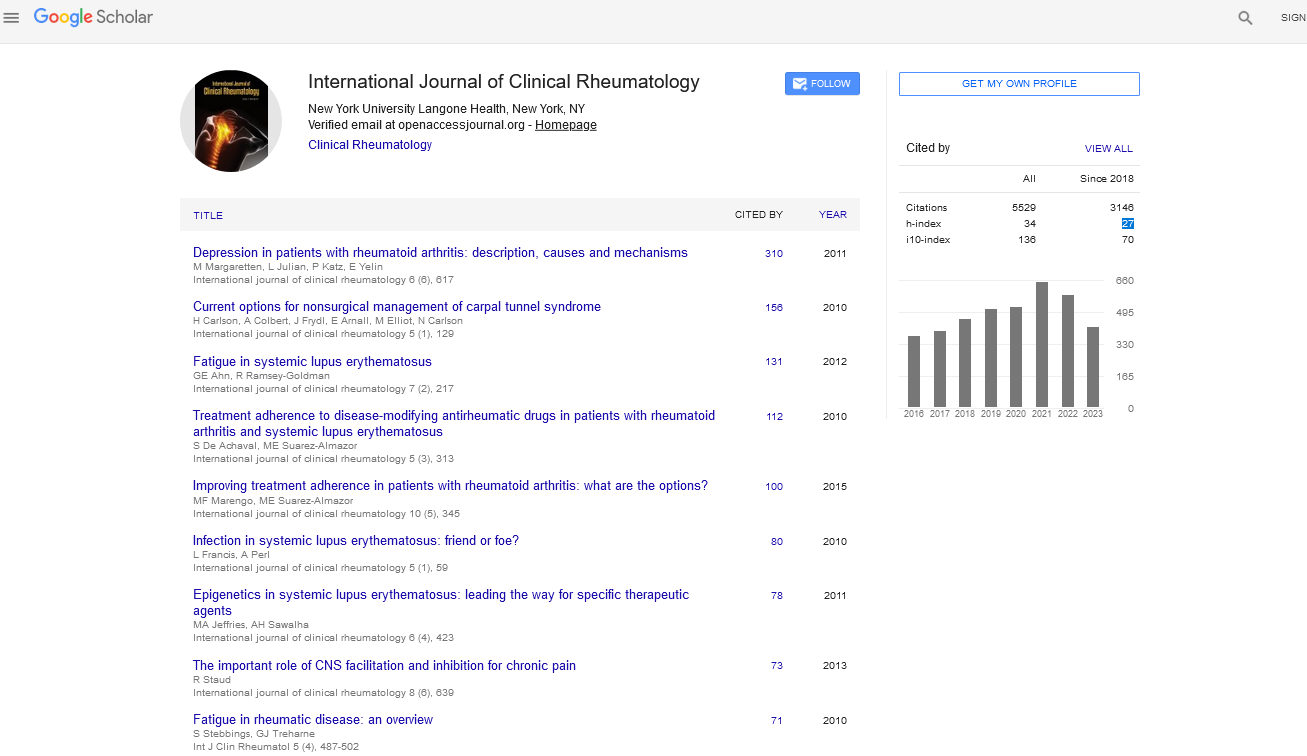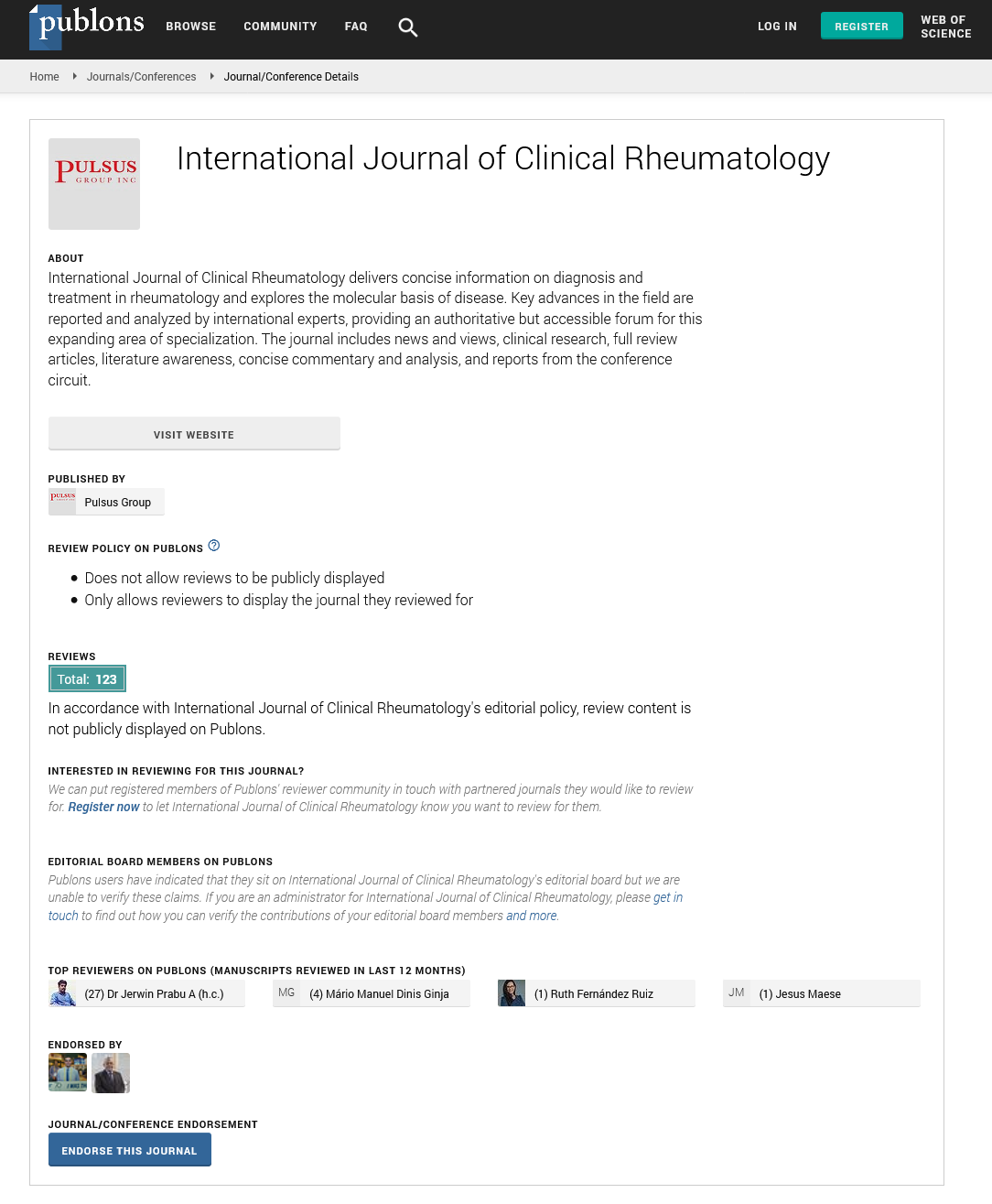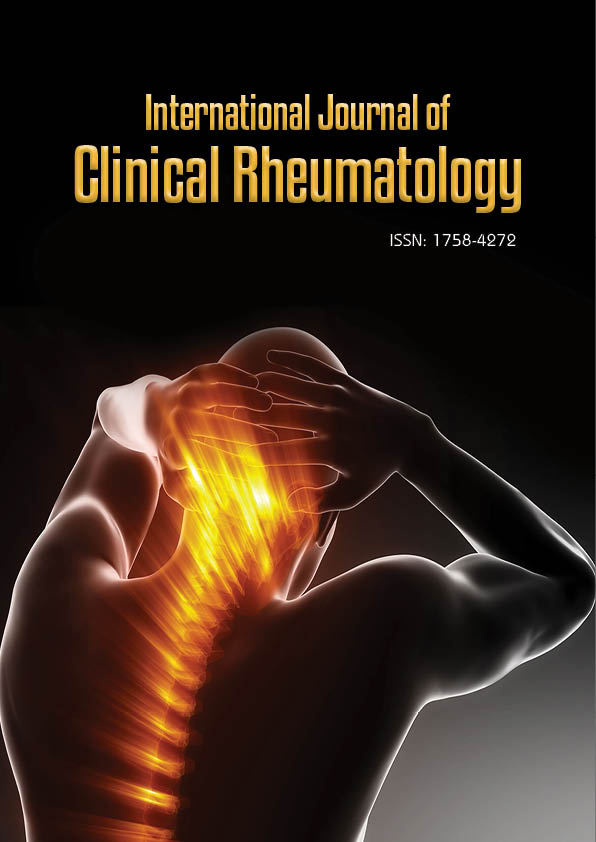Editorial - International Journal of Clinical Rheumatology (2023) Volume 18, Issue 11
Locating to the Bottom of Effective Pain Management Techniques for Rheumatologic Conditions
Richard Liew*
Department of Medicine, Division of Rheumatology and Clinical Immunology, University of Dublin, Dublin, Ireland
Department of Medicine, Division of Rheumatology and Clinical Immunology, University of Dublin, Dublin, Ireland
E-mail: richa.rd@liew.il
Received: 02-Nov-2023, Manuscript No. fmijcr-23-120050; Editor assigned: 06- Nov-2023, Pre-QC No. fmijcr-23-120050 (PQ); Reviewed: 20-Nov-2023, QC No. fmijcr-23-120050; Revised: 22-Nov- 2023, Manuscript No. fmijcr-23-120050 (R); Published: 30-Nov-2023, DOI: 10.37532/1758-4272.2023.18(11).355-358
Abstract
This abstract delves into the exploration of effective pain management techniques for rheumatologic conditions, aiming to uncover strategies that can provide substantial relief to individuals grappling with these challenges. The study reviews a spectrum of interventions, ranging from pharmaceutical approaches to complementary therapies, assessing their efficacy and potential side effects. Additionally, the abstract considers the impact of lifestyle modifications and psychosocial factors on pain perception in rheumatologic patients. By navigating through the depths of available literature, this abstract aspires to illuminate promising avenues for optimizing pain management in the realm of rheumatology, ultimately contributing to enhanced well-being and improved quality of life for those affected by these conditions.
Keywords
Rheumatologic conditions • Pain management • Pharmaceutical interventions • Complementary therapies
Introduction
Rheumatologic conditions encompass a diverse range of disorders, including but not limited to rheumatoid arthritis, osteoarthritis, lupus, and ankylosing spondylitis, all of which share a common hallmark—chronic and often debilitating pain. Managing pain in these conditions poses a significant challenge due to their complex etiology and variable clinical manifestations. This research article aims to explore and navigate the multifaceted landscape of pain management in rheumatologic conditions, shedding light on emerging strategies and interventions that hold promise for enhancing the overall wellbeing of affected individuals [1].
The complexity of rheumatologic pain
The pain experienced by individuals with rheumatologic conditions extends beyond the physical realm, infiltrating the emotional and psychological dimensions of their lives. It is imperative to recognize the intricate interplay between inflammatory processes, structural damage, and the subjective experience of pain. This introduction sets the stage for a comprehensive examination of the various facets that contribute to the complexity of pain in rheumatologic disorders [2].
The pain experienced by individuals grappling with rheumatologic conditions transcends mere physical discomfort, weaving a complex tapestry that extends into the emotional and psychological realms. Rheumatoid arthritis, osteoarthritis, lupus, and ankylosing spondylitis, among others, manifest not only as disorders of the joints and connective tissues but also as profound challenges to one's overall well-being. The intricacy lies in the multifactorial nature of rheumatologic pain, where inflammatory processes and structural damage intertwine with the subjective and deeply personal experience of suffering [3]. Beyond the measurable symptoms and clinical parameters, the individual's perception of pain becomes a crucial determinant in understanding the full scope of their condition. This complexity necessitates a nuanced exploration that goes beyond traditional medical perspectives, acknowledging the diverse dimensions through which rheumatologic pain manifests and profoundly impacts the lives of those affected.
Current paradigms in pain management
A critical analysis of existing paradigms in pain management forms a foundational component of this exploration. From traditional pharmacological interventions to the growing embrace of complementary therapies, this section aims to provide a nuanced understanding of the tools currently available to healthcare practitioners and the limitations inherent in each approach [4].
Beyond medications: exploring lifestyle modifications
Recognizing the interconnectedness of lifestyle factors and pain perception, this article delves into the impact of lifestyle modifications on rheumatologic pain. From exercise regimens to dietary considerations, investigating non-pharmacological avenues becomes pivotal in offering a holistic approach to pain management. Acknowledging the influence of psychosocial factors on the experience and perception of pain, this research article explores the intricate tapestry of emotions, stress, and mental health in the context of rheumatologic conditions [5]. Understanding these dynamics is crucial for tailoring interventions that address the complete spectrum of challenges faced by individuals grappling with chronic pain. In navigating through these subheadings, this research article seeks to provide a comprehensive overview of the current landscape of pain management in rheumatologic conditions, laying the groundwork for further exploration into effective strategies that can significantly improve the lives of those affected.
Result and Discussion
Pharmacological interventions
The examination of various pharmacological interventions reveals a spectrum of outcomes in the management of rheumatologic pain. While nonsteroidal anti-inflammatory drugs (NSAIDs) and diseasemodifying antirheumatic drugs (DMARDs) remain cornerstones of treatment, their efficacy varies across different conditions. This section elucidates the nuanced results of pharmaceutical approaches, considering not only pain reduction but also potential side effects and long-term implications [6].
Complementary therapies
Beyond conventional medications, complementary therapies emerge as noteworthy contributors to the pain management arsenal. From acupuncture and massage to dietary supplements, the results of incorporating these approaches are explored. Assessing the evidence surrounding their efficacy and patient-reported outcomes adds a layer of depth to the understanding of complementary interventions in the context of rheumatologic pain. The results gleaned from studies on lifestyle modifications, including tailored exercise regimens and dietary adjustments, offer valuable insights into their impact on pain severity. This section dissects the findings, highlighting the potential of non-pharmacological interventions to complement traditional approaches and improve overall pain outcomes [7].
Discussion
Synthesis of findings
As we synthesize the results, a comprehensive understanding of effective pain management strategies for rheumatologic conditions begins to unfold. The interplay between pharmacological interventions, complementary therapies, and lifestyle modifications underscores the importance of a multidimensional approach. Recognizing the heterogeneity across rheumatologic disorders, the discussion delves into the implications of tailoring interventions based on specific conditions, patient profiles, and disease trajectories [8]. The discussion acknowledges the challenges inherent in addressing the complexity of rheumatologic pain. From the variability in treatment response to the potential for adverse effects, navigating these challenges requires a balanced consideration of risks and benefits. Simultaneously, opportunities for innovation and personalized approaches arise, paving the way for the integration of novel strategies and emerging technologies in the pursuit of more effective pain management solutions [9].
While challenges persist, ranging from treatment response variability to the potential for adverse effects, they serve as catalysts for innovation. Ongoing research and the integration of emerging technologies provide opportunities to address these challenges, paving the way for advancements in rheumatologic pain management.
Examining the interplay of psychosocial factors in rheumatologic pain adds a layer of depth to the discussion. Stress, emotional well-being, and mental health intricately influence pain perception and treatment outcomes. Recognizing the symbiotic relationship between the mind and the body becomes paramount in crafting holistic and patient-centered interventions.
In navigating the results and discussions, this research article aims to contribute to the ongoing dialogue on optimizing pain management for individuals grappling with rheumatologic conditions. By unraveling the intricacies of available interventions and acknowledging the multifaceted nature of pain, we pave the way for a more nuanced and effective approach to enhancing the quality of life for those affected by these challenging disorders [10].
Conclusion
In concluding our exploration of effective pain management strategies for rheumatologic conditions, it becomes evident that the complexity of these disorders demands a multifaceted and integrated approach. The amalgamation of pharmacological interventions, complementary therapies, lifestyle modifications, and a nuanced consideration of psychosocial factors emerges as a promising avenue for optimizing outcomes. The synthesis of diverse interventions underscores the importance of integrating treatment modalities tailored to individual needs. Recognizing the heterogeneity within rheumatologic conditions, a personalized approach that considers the specificities of each disorder and the unique profiles of patients becomes pivotal. This not only enhances efficacy but also mitigates potential risks and side effects associated with a one-size-fits-all mentality.
Lifestyle modifications, encompassing targeted exercise and dietary adjustments, reveal their potential to significantly impact pain severity. Moreover, the acknowledgment of psychosocial factors as integral components of pain experience underscores the importance of holistic care. Incorporating mental health support, stress management, and patient education into the treatment paradigm contributes to a more comprehensive and patient-centered approach.
Implications for future research and clinical practice
As we conclude, the implications for future research and clinical practice become clear. Further investigations into the long-term effects of integrated interventions, the role of emerging technologies, and the development of targeted therapies hold promise for refining and expanding our approach to rheumatologic pain management. The translation of research findings into practical, patient-centered clinical strategies is essential for bridging the gap between scientific knowledge and tangible improvements in the lives of individuals affected by rheumatologic conditions.
In essence, this exploration serves as a stepping stone toward a more comprehensive and effective paradigm of pain management in rheumatologic disorders. By embracing the complexity of these conditions and navigating the intricacies of available interventions, we aspire to contribute to a future where individuals with rheumatologic conditions can experience not only relief from pain but a holistic enhancement of their overall well-being.
While challenges persist, ranging from treatment response variability to the potential for adverse effects, they serve as catalysts for innovation. Ongoing research and the integration of emerging technologies provide opportunities to address these challenges, paving the way for advancements in rheumatologic pain management.
Acknowledgment
None
Conflict of Interest
None
References
- Demirkaya E, Acikel C, Hashkes P et al. Development and initial validation of international severity scoring system for familial Mediterranean fever (ISSF). Ann Rheum Dis. 75(6), 1051-6 (2016).
- Ozen S, Demirkaya E, Erer B et al. EULAR recommendations for the management of familial Mediterranean fever. Ann Rheum Dis. 75(4), 644-51 (2016).
- Ben-Chetrit E, Aamar S. About colchicine compliance, resistance and virulence. Clin Exp Rheumatol. 27(2 Suppl 53), S1-3.
- Dahan A, Sabit H, Amidon GL. Multiple efflux pumps are involved in the transepithelial transport of colchicine: combined effect of p-glycoprotein and multidrug resistance-associated protein 2 leads to decreased intestinal absorption throughout the entire small intestine. Drug Metab Dispos. 37(10), 2028-36 (2009).
- Tateishi T, Soucek P, Caraco Y et al. Colchicine biotransformation by human liver microsomes. Identification of CYP3A4 as the major isoform responsible for colchicine demethylation. Biochem Pharmacol [Internet]. 53(1), 111-6 (1997).
- Ozkaya N, Yalcinkaya F. Colchicine treatment in children with familial Mediterranean fever. Clin Rheumatol. 22(4-5), 14-7 (2003).
- Hitzl M, Drescher S, van der Kuip H et al. The C3435T mutation in the human MDR1 gene is associated with altered efflux of the P-glycoprotein substrate rhodamine 123 from CD56+ natural killer cells. Pharmacogenetics.11(4), 293-8 (2001).
- Bijl MJ, Visser LE, Hofman A et al. Influence of the CYP2D6*4 polymorphism on dose, switching and discontinuation of antidepressants. Br J Clin Pharmacol. 65(4), 558-64 (2008).
- Bezalel Y, Gershoni-Baruch R, Dagan E et al. The 3435T polymorphism in the ABCB1 gene and colchicine unresponsiveness in familial Mediterranean fever. Clin Exp Rheumatol.27(2 Suppl 53), S103-4 (2009).
- Rüstemoglu A, Gümüş-Akay G, Yigit S et al. Analysis of common MDR1 (ABCB1) gene C1236T and C3435T polymorphisms in Turkish patients with familial Mediterranean fever. Genet Mol Res. 10(4), 3411-20 (2011).
Indexed at, Google Scholar, Crossref
Indexed at, Google Scholar, Crossref
Indexed at, Google Scholar, Crossref
Indexed at, Google Scholar, Crossref
Indexed at, Google Scholar, Crossref
Indexed at, Google Scholar, Crossref
Indexed at, Google Scholar, Crossref


